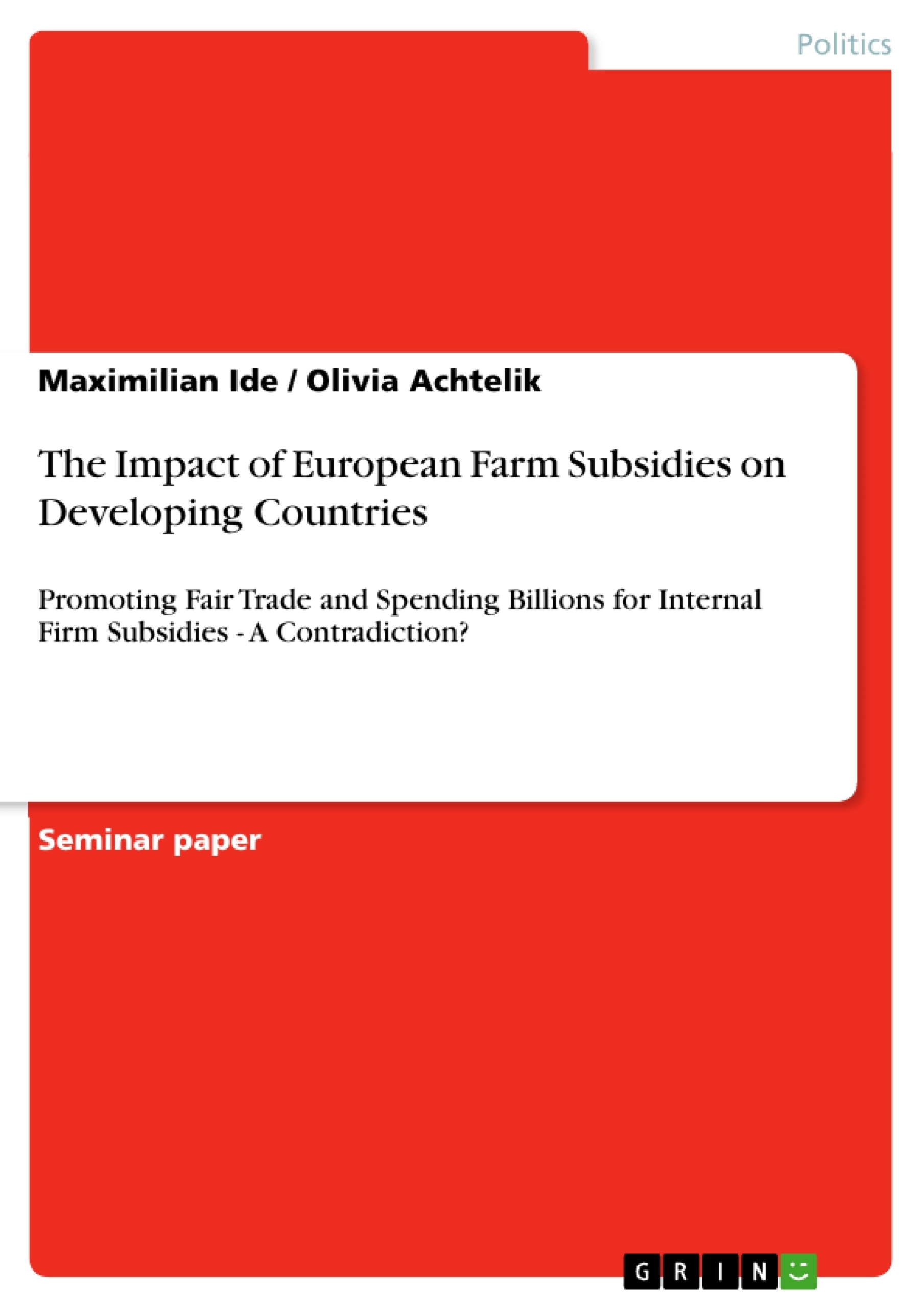The importance of Fair Trade products for the world economy has been significantly growing within the last decade. In 2010, the global Fair Trade turnover reached €3.4 billion showing an upward trend with double-digit growing rates per year. One of the biggest selling markets for certified Fair Trade products is the European Union (EU) which is thus a crucial actor when it comes to promote and market Fair Trade goods (see attached table 1).
Yet, besides the EU’s effort of achieving a fairer international trading system, it can be argued that the EU might be even partially responsible for the misery in those countries. In this context the Common Agricultural Policy (CAP) of the EU is controversially discussed. About €60 billion which account for 42% of the total EU budget are currently spent on agricultural subsidies. They are provided to European farmers to support and protect the internal agricultural market. Consequences for other agrarian countries are immense.
In our research paper we want to investigate the paradox on Europe spending money on Fair Trade on the one hand, while dishing out harming subsidies on the other hand. We question whether it would be more beneficial for developing countries if Europe stepwise reduces its agricultural subsidies to a minimum rather than investing in Fair Trade.
First of all, a brief introduction to the Fair Trade principles and its history is provided. The main efforts of the EU to achieve a fairer trading system are identified in Chapter 3. Chapter 4 will briefly present the basic principles of the EU’s Common Agricultural Policy (CAP) including the payment of direct farm subsidies to European farmers. Chapter 5 will reveal how Europe’s agricultural subsidies influence the world market and which consequences arise for developing countries. A comparative analysis contrasting the fair trade concept and the reduction of subsidies is conducted in chapter 6. A conclusion is provided in chapter 7.
Inhaltsverzeichnis (Table of Contents)
- Introduction
- What is Fair Trade
- Fair Trade in Europe
- EU Common Agricultural Policy (CAP)
- How Subsidies Affect Market Prices
- Subsidized Exports to Developing Countries
- The European “Sugar Regime”
- Abandoning Agricultural Subsidies versus Promoting Fair Trade
- Conclusion
Zielsetzung und Themenschwerpunkte (Objectives and Key Themes)
This research paper investigates the paradox of Europe's support for Fair Trade while simultaneously providing agricultural subsidies that potentially harm developing countries. The objective is to evaluate whether reducing European agricultural subsidies would be more beneficial for developing countries than investing in Fair Trade.- The principles and history of Fair Trade
- The EU's efforts to promote Fair Trade
- The EU's Common Agricultural Policy (CAP) and its impact on developing countries
- The effects of agricultural subsidies on market prices and developing countries
- A comparative analysis of Fair Trade and agricultural subsidy reduction
Zusammenfassung der Kapitel (Chapter Summaries)
- Introduction: This chapter highlights the increasing importance of Fair Trade products globally, especially in the European Union. It introduces the concept of agricultural subsidies and their potential impact on developing countries. The paper aims to analyze the paradox of Europe's support for Fair Trade while simultaneously providing subsidies that could be detrimental to developing countries.
- What is Fair Trade: This chapter defines Fair Trade, emphasizing its focus on providing fair prices and empowering farmers in developing countries. It highlights the concerns of Fair Trade organizations regarding subsidies provided by developed countries for their agricultural sectors, which can distort market prices and hinder competition from developing countries.
- Fair Trade in Europe: This chapter explores Europe's initiatives to promote Fair Trade. It describes the EU's commitment to sustainable development and its efforts to support Fair Trade through various initiatives, including the European Fair Trade Association (EFTA) and the World Fair Trade Organization (WFTO) Europe.
- EU Common Agricultural Policy (CAP): This chapter presents the basic principles of the EU's Common Agricultural Policy (CAP), emphasizing the significant amount of funding allocated to agricultural subsidies for European farmers. It discusses the potential consequences of these subsidies on developing countries.
- The Impact of Subsidies on Developing Countries: This chapter examines how agricultural subsidies affect global market prices and the consequences for developing countries. It explores the impact of subsidized exports from Europe to developing countries and investigates the European "Sugar Regime" as a case study.
- Abandoning Agricultural Subsidies versus Promoting Fair Trade: This chapter provides a comparative analysis of reducing agricultural subsidies versus promoting Fair Trade. It examines the potential benefits and drawbacks of each approach for developing countries.
Schlüsselwörter (Keywords)
This research paper focuses on the intersection of Fair Trade, agricultural subsidies, and developing countries. The key concepts include Fair Trade principles, European Union policies, Common Agricultural Policy (CAP), market price distortions, subsidized exports, and the European "Sugar Regime." The study aims to analyze the impact of these factors on the development of developing countries and explore potential solutions.- Citar trabajo
- Maximilian Ide (Autor), Olivia Achtelik (Autor), 2011, The Impact of European Farm Subsidies on Developing Countries, Múnich, GRIN Verlag, https://www.grin.com/document/195006




